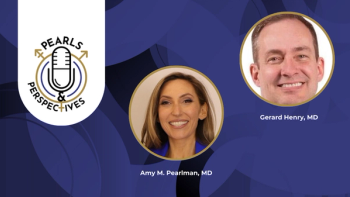
Dr. Tsambarlis on platelet-rich plasma and shock wave therapy for erectile dysfunction

In this video, Peter N. Tsambarlis, MD, discusses regenerative therapies for erectile dysfunction. Tsambarlis is a urologist with Northwestern Medicine in Chicago, Illinois.
Transcription:
Please provide an overview of regenerative therapies for erectile dysfunction.
The 2 main regenerative therapies are platelet-rich plasma [PRP] and shock wave therapy. But regenerative therapies is a much bigger group than that; it includes things like stem cell therapy, there are some studies with amniotics, but the 2 that are getting the most energy and the most momentum are PRP and shock wave therapy.
Do patients frequently ask you about regenerative therapies for ED? What do you tell them?
These are extremely popular. Obviously, we practice in Chicago, which is a really big city, and you have a subset of people who do a ton of research, by the looser definition, certainly, and want to know more about these therapies. They usually come in with a specific goal, in my experience. "I want to know about shock wave." "I want to know about PRP and if it's good for me." I try to cater the response to who it is. For example, I don't think there's anyone for whom we have good data that PRP is efficacious. But we know it's safe. But those are 2 important but very different things. Just because something is safe doesn't mean it's the best treatment option. There are just no good data that say that this is going to work for erectile dysfunction. I think that's what we want to focus on here. But certainly, there are wonderful data for PRP in the orthopedic literature. But we're not seeing it in erectile dysfunction, and even less so in things like Peyronie disease, which fall under the sexual health umbrella, but in reality are not what people are coming in for on a regular basis in my clinic. Now, the shock wave, on the other hand is really different. Shock wave has some emerging data that are getting stronger and stronger. It may not be a perfect therapy right now for everybody. And as we start to cater, who are the best candidates? What are the appropriate settings? What are the best machines? We're finding out that there are a subset of ED patients who are benefiting from shock wave, and it is more of a call to research. How do we identify the proper protocol? How do we optimize patient selection to get these things to work? But since we don't exactly know, I don't think it's wrong to offer it in patients for whom you have a reasonable expectation of success, but you have to be really transparent about it. You can't promise the world if you don't have the world to give.
Is there anything you would like to add?
PRP is not ready to be utilized as a treatment. It can be utilized as an experimental, but do it in the setting of an experiment, of a trial, something that's controlled. Shock wave is way further down the road, in my opinion. I think it's a reasonable option, as long as you're transparent about it. But you still have to make sure as a patient that you're getting that therapy from somewhere that has, for example, focal shock waves. A lot of these outside clinics are using radial waves, and we have excellent trade of them that is not useful. Not all shock wave is created equal, and it underscores the importance of going somewhere that you can trust. I think even if this is offered as a therapy, which maybe is associated with some sort of reimbursement, it needs to be somewhere where the data can be tracked. I think there's kind of a gray area - are we at the point where this is ready for primetime and this can be offered? "I'm not sure," is the answer. But there are enough encouraging data that say it is definitely safe and might be efficacious, that I think at least if we're tracking the data, we can provide benefit to some people and then utilize what we learn to help a larger portion.
This transcription was edited for clarity.
Newsletter
Stay current with the latest urology news and practice-changing insights — sign up now for the essential updates every urologist needs.






